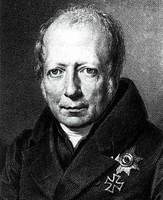Liberty Matters
Humboldt and What It Is to be Human
 My interlocutors bring important contributions to our discussion: Edoardo Tortarolo through his knowledge – greater than mine - of Enlightenment political thought, especially in the German lands; Hartmut Kliemt through his expertise in political economy and his proposed revisions of what Humboldt’s state (and ours) amount to; and Hardy Bouillon who charmingly carries a culinary spoon to conceal the philosophical stiletto in his other hand, drawing blood in the gentlest possible way from my less plausible contentions.
My interlocutors bring important contributions to our discussion: Edoardo Tortarolo through his knowledge – greater than mine - of Enlightenment political thought, especially in the German lands; Hartmut Kliemt through his expertise in political economy and his proposed revisions of what Humboldt’s state (and ours) amount to; and Hardy Bouillon who charmingly carries a culinary spoon to conceal the philosophical stiletto in his other hand, drawing blood in the gentlest possible way from my less plausible contentions.Two propositions that I wish to defend, all the same, are the following. First, that Humboldt did not have before him a state to delimit; and, second, that Humboldt conceived his state as a deliberative outcome whereas ours is an always-already precipitate with intrinsic intractabilities.
I am told that Humboldt shared a created environment with at least two ‘states:’ that of Frederick the Great in Berlin and of Maria Theresa in Vienna. These regimes made their subjects do things; their subjects recognized that the compulsion possessed legitimacy as well as inevitability. But all regimes do that and they do not ipso facto become states in the act of doing it. They remain regimes. Weber misconstrued the point in announcing that states must be understood as agencies that possess a monopoly of force. They need in fact to possess a good deal more; and the ‘more,’ I argued, came into being in the three generations after Humboldt’s death. That transformation seems to me pivotal in making sense of the modern state.
I neither believe that Humboldt simply failed (reasonably) to foresee later developments nor do I see – as I suspect Hartmut does – an historical ‘process’ that would lead inevitably to WEIRDness in modern society and into which Humboldt’s state needs to be enfolded. These moods to my mind detract from Humboldt’s singularity and the zeitbedingt character of his thought. And Hardy’s stiletto misses, for once, in saying that Humboldt’s state was a ‘forerunner’ of the modern one. I claim that it is better conceived as a different entity and that no historical configuration is a ‘forerunner’ of anything else. The contestation rests, of course, on a healthy divergence of fields. Economists and philosophers have no difficulty with teleology. Historians vomit over it.
In drawing a severe contrast between Humboldt’s state and that with which we are all too familiar, I wanted to draw attention to a certain, time-deep disposition in the behaviour of a ‘state’ in an advanced, Hartmut might want to say WEIRD, society. This has implications for libertarian theory. It implies that the Thatcherite persuasion in Britain, with its language of ‘rolling back the frontiers of the state’ did not understand what it was up against because the modern state has no frontiers, only tentacles and rhetorical chloroform. It observes that the more extreme anti-statism in the US may equally have bitten off more than it can chew. It may be that a ‘minimalist welfare state’ in Hartmut’s formulation, can square what looks like a circle and become practical politics. Yet in most societies of the West, the pursuit of an organic ideal, the we-are-all-in-this-together style of discourse, has produced a congealed culture of governance-within-society that bears no relation to Humboldt’s optimism and no longer permits his open future.
His legacy does not disappear with that closing future. It becomes a poetic appeal to remember what it is to be human.
Copyright and Fair Use Statement
“Liberty Matters” is the copyright of Liberty Fund, Inc. This material is put on line to further the educational goals of Liberty Fund, Inc. These essays and responses may be quoted and otherwise used under “fair use” provisions for educational and academic purposes. To reprint these essays in course booklets requires the prior permission of Liberty Fund, Inc. Please contact oll@libertyfund.org if you have any questions.